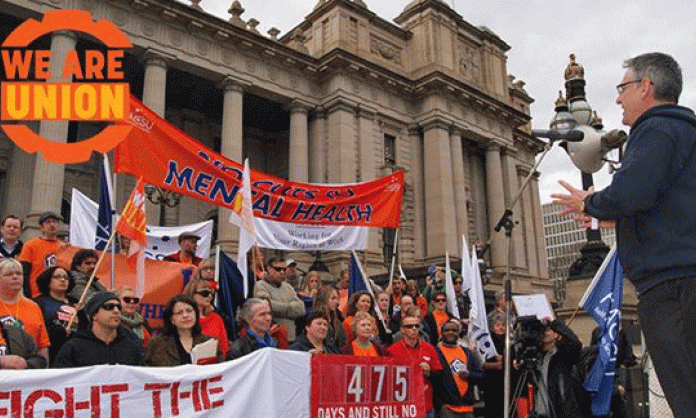About 150 Victorian disability and mental health workers marched to the steps of parliament on 20 August. Organised by the Health and Community Services Union (HACSU), the rally demanded a reversal of state government plans to privatise public services in the sector.
Addressing the rally, HACSU state secretary Lloyd Williams described a “perfect storm” of cuts, closures and contracting out affecting drug and alcohol, adult and aged mental health services. He spoke of “spiralling” violence against mental health workers in a system drained of resources.
Workers at the rally say they fear a drop in pay (by around 30 per cent), worsening conditions, poor resourcing and low unionisation levels in non-government and private disability services.
“The Department of Human Services don’t care about the most vulnerable people in the community”, said disability worker Deb Sturt. “They care about wiping their hands of them.” Deb works at the Sandhurst Centre in Bendigo, a government-run facility that has been in the shadow of closure for 14 months.
Sandhurst workers have been fighting a locally based campaign against closure and for job certainty. Speaking to Red Flag, Deb said that a new, privately run service will seek to employ less qualified, lower paid staff. Many of Sandhurst’s 80 staff have worked there for decades and have developed important relationships with residents.
The minister for disability services, Mary Woolridge, says that a new private facility in Bendigo will provide more “flexible and innovative” accommodation. Deb says the change will leave a complex client group at great risk of distress without expert staff to care for them.
Victorian state opposition leader Daniel Andrews promised the rally that a Labor government would not sell off mental health and disability care and that Sandhurst residents would be placed in public facilities.
Later that day, the Napthine government announced it would fast-track the Sandhurst tendering, which will place residents in privately run services.
HACSU’s campaign strategy appears to be based on securing the election of a Labor government in the November state elections. But cuts, closures and privatisation are not solely the product of Liberal governments. Unionists will need to wage grassroots campaigns to save quality public mental health and disability services even if the government changes.










